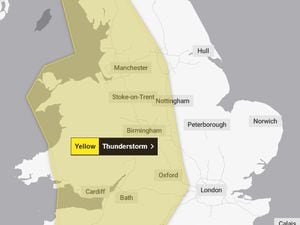Government 'has chickened out' of fast action on sewage in rivers - campaigner
A river clean-up campaigner reckons the Government has "chickened out" of acting fast to get rid of controversial storm water overflows.

Storm water overflows, like those in Shrewsbury, are a legacy of a Victorian sewage system, mixing water from the sewers when it rains heavily - and dumping it straight into the River Severn.
The Department for Environment is consulting on a new plan to tackle the issue. But the plans give a first target date of 13 years away, in 2035, when it wants to sort it out for "the most important protected sites".
Jane Asterley Berry, who is one of the founders of Up Sewage Creek, believes action should be taken much faster. Even by 2050 discharges from the overflows will still be happening under the plans.
"The Government has chickened out," said Jane.
"I agree with Chris Whitty who has been quoted saying that the discharge of raw sewage should be an exceptionally rare event.
"By 2050 the rivers will be decimated. It is a crazy place to end up."
She and other campaigners believe that water companies should have been investing in modernising the system since they were privatised in the early 1990s.
"It means that we will be paying once in our bills, and then again through our taxes for something that should have been done before now," she said.
"They have already had a long time to institute this change but they are still expecting to be able to ride it out until 2050."
Jane urged everyone to have their say to press the Government to take action "much further and faster".
Ludlow MP Philip Dunne has welcomed moves to give Ofwat and the Environment Agency power to take enforcement action where needed.
Mr Dunne chairs parliament’s Environmental Audit Committee, which published a report on water quality in rivers in January this year, with recommendations to government on how to improve river water quality.
The MP said: “The Government’s announcement represents a sea change in policy action around sewage. It acknowledges many of the committee’s recommendations.”
“We are under no illusions that the scale of the challenge is significant, but when executives are paid handsomely and utility bills rising, consumers expect and demand more.
“There is simply no excuse for the substandard infrastructure and damaging practices which have such a negative impact on our rivers, especially during a climate and nature crisis.”
Views are sought from the public on the targets as part of a suite of measures to be considered for the final Storm Overflows Discharge Reduction Plan, which will be published in September.
Environment Secretary George Eustice said: "We are the first government to set out our expectation that that water companies must take steps to significantly reduce storm overflows."
Between 2020 and 2025, water companies are investing £7.1 billion to protect and improve the environment.
Environment Agency chief executive Sir James Bevan said: "Water companies need to go further and faster in tackling the damage caused by storm overflows, so these targets aimed at drastically reducing the number of harmful discharges are a welcome development."
The consultation is open until May 12.
It is estimated that complete separation of sewage and rainwater systems would remove the need for storm overflows, however this would cost between £350 billion and £600 billion. It would also cause significant disruption.
Most of the combined systems run under our towns and cities and would have to be dug up, the Government says.
The consultation is here: https://consult.defra.gov.uk/water-industry/storm-overflows-discharge-reduction-plan/




